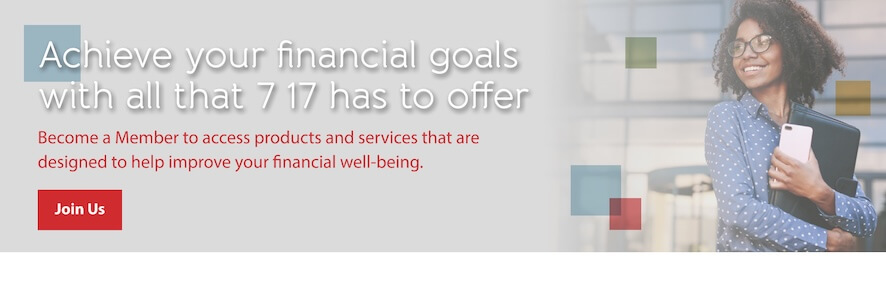- 7 17 Staff
October is National Cybersecurity Awareness Month

October is National Cybersecurity Awareness Month, emphasizing the need to stay ahead of cyberthreats in an increasingly connected world. With the cost of data breaches rising, protecting your personal information is more critical than ever.
At 7 17 Credit Union, we provide strong security solutions. Yet, your own proactive measures can make a significant impact. Check out our practical advice on boosting your cybersecurity and safeguarding your digital life.
What Is Cybersecurity?
Cybersecurity is essential for defending your critical systems and sensitive information from digital threats. It’s about safeguarding networks and applications from attacks that can come from inside or outside an organization. Cybercriminals frequently target personal data, such as Social Security numbers and credit card details, which they can sell on the dark web.
The impact of a data breach is not just about immediate disruption — it’s also financial. In 2024, the average global cost of a breach has risen to $4.88 million, with the average in the U.S. reaching $9.44 million. These costs cover everything from breach detection and response to downtime, lost revenue and damage to your reputation.
Cybersecurity Begins with You
At 7 17 Credit Union, we employ top-tier security measures to protect your online and mobile banking. However, your active vigilance is key to further protection. Here are some practical steps you can take to enhance your cybersecurity:
Home Security Tips
- Use separate devices: Designate different devices for work and personal activities to minimize risk.
- Secure connections: Prefer wired Ethernet connections or secure Wi-Fi networks. Use a virtual private network (VPN) when accessing work-related data.
- Update firmware: Regularly update the firmware of your router and modem.
- Strong passwords: Protect smart devices with strong, unique passwords to deter unauthorized access.
Traveling Safely
- Avoid public Wi-Fi: Refrain from using public Wi-Fi for sensitive transactions. Opt for a personal hotspot instead.
- Device security: Keep your devices secure and within sight at all times.
- Disable auto-connect features: Turn off automatic Bluetooth pairing and Wi-Fi connections to avoid accidental connections to unknown networks.
- Charging precautions: Avoid using public or borrowed chargers.
Cloud Security Essentials
- Multi-factor authentication (MFA): Whenever possible, enable MFA, which requires a secondary device for verification.
- Password management: Use complex, unique passwords for each account and avoid saving them in your browser.
- Secure communication: Keep work communications within approved systems and regularly review app privacy settings to restrict unnecessary access.
Physical Security Measures
- Avoid unknown USBs: Do not use unfamiliar USB devices, as they could carry malware.
- Lock workstations: Always lock your computer when leaving it unattended.
- Confidential information: Use privacy screens and headphones when handling sensitive information in public spaces.
- Clean desk policy: Maintain a clean desk policy to protect confidential documents and avoid unauthorized access.
Protecting Your Finances
- Monitor statements: Regularly review your account statements and transaction history for any unauthorized or unusual activity. Frequent checks help you catch issues early and minimize potential damage.
- Opt for credit cards online: Use credit cards for online purchases, as they offer better fraud protection and limit the impact on your checking account.
- Protect your PIN: Keep your PIN confidential and avoid writing it down. Use the debit card’s credit function when making purchases to keep your PIN secure.
- Stay alert: Be vigilant against common scams and phishing attempts. Watch for misspellings, incorrect URLs and generic requests for information. Avoid clicking on suspicious links or sharing personal information.
- Avoid using public Wi-Fi for financial transactions: Use a secure, password-protected network or mobile data rather than public Wi-Fi when checking your financial accounts to reduce the risk of hackers capturing your information.
Understanding and Preventing Account Takeover Fraud
Account takeover fraud (ATO) involves attackers gaining control of legitimate accounts, leading to various attacks. To prevent ATO:
- Monitor account activity: Regularly check your statements and transactions for unauthorized activity. Report any suspicious findings immediately to prevent potential damage.
- Implement MFA: Add an extra layer of security with multi-factor authentication.
- Be aware of phishing: Stay vigilant against phishing attempts. Always verify the authenticity of suspicious communications and avoid clicking on unverified links.
Stay Vigilant
Fraud and scams continue to evolve, but staying informed and proactive can help protect your personal and financial information. During Cybersecurity Awareness Month, take the opportunity to review and enhance your security practices.
Become a 7 17 Credit Union member today and enjoy personalized service and a wide range of financial products designed to meet your goals.
